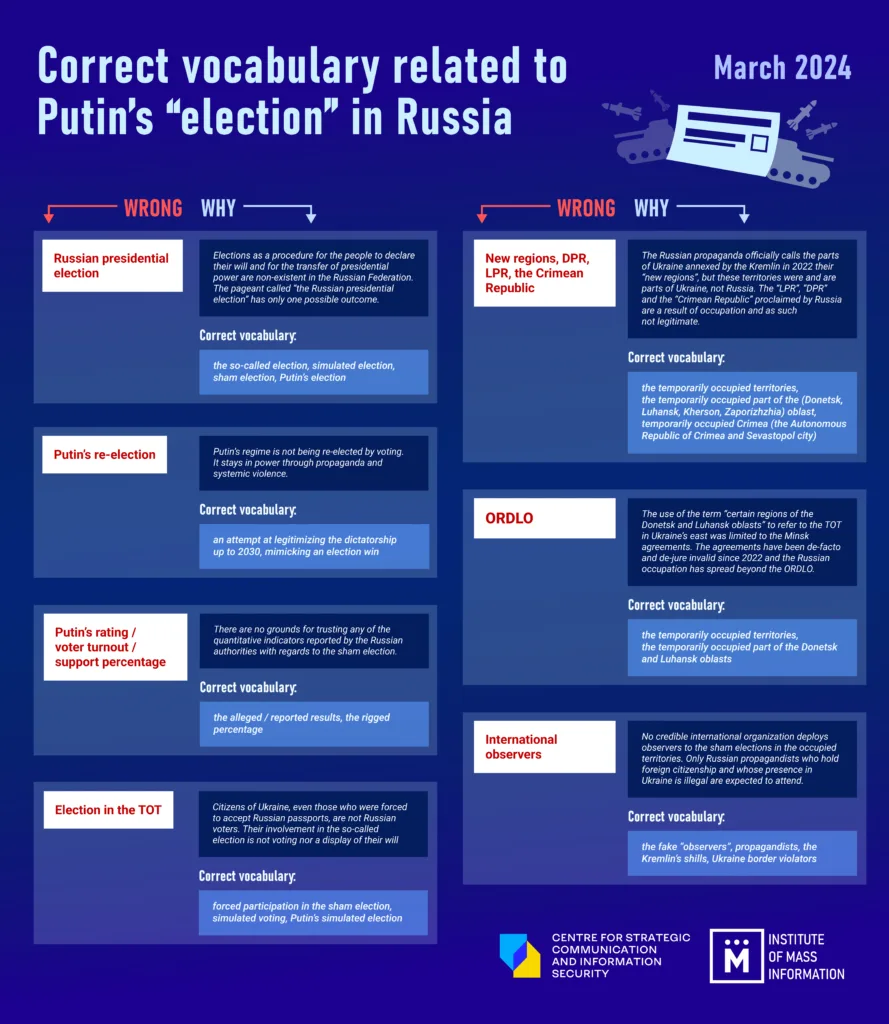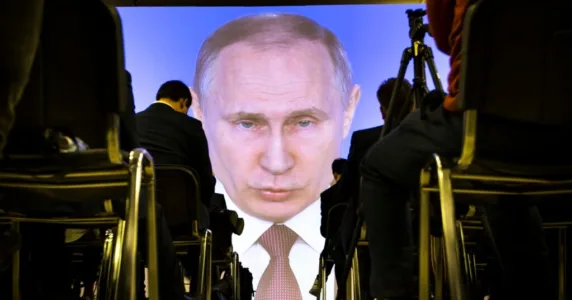Navigation and useful materials
Russia is set to have another “election” on March 17. Despite the dictatorship reigning in the country, Moscow often mimics “displays of the people’s will” to legitimize Putin’s regime and its control over Ukraine’s temporarily occupied parts.
Unfortunately, echoes of Russian propaganda – such as terms that misrepresent reality – can still be spotted in journalistic articles and public figures’ speeches.
The Center for Strategic Communications and Information Security partnered with the Institute of Mass Information to develop recommendations and warnings regarding the use of certain terms related to the Russian election.

Let us speak and write correctly:
| WRONG | WHY |
| Russian presidential election | Elections as a procedure for the people to declare their will and for the transfer of presidential power are non-existent in the Russian Federation. The pageant called “the Russian presidential election” has only one possible outcome. Correct vocabulary: the so-called election, simulated election, sham election, Putin’s election |
| Putin’s re-election | Putin’s regime is not being re-elected by voting. It stays in power through propaganda and systemic violence. Correct vocabulary: an attempt at legitimizing the dictatorship up to 2030, mimicking an election win |
| Putin’s rating / voter turnout / support percentage | There are no grounds for trusting any of the quantitative indicators reported by the Russian authorities with regard to the sham election. Correct vocabulary: the alleged / reported results, the rigged percentage |
| Election in the TOT | Citizens of Ukraine, even those who were forced to accept Russian passports, are not Russian voters. Their involvement in the so-called election is not voting nor a display of their will. Correct vocabulary: forced participation in the sham election, simulated voting, Putin’s simulated election |
| New regions, DPR, LPR, the Crimean Republic | The Russian propaganda officially calls the parts of Ukraine annexed by the Kremlin in 2022 their “new regions”, but these territories were and are parts of Ukraine, not Russia. The “LPR”, “DPR” and the “Crimean Republic” proclaimed by Russia are a result of occupation and as such not legitimate. Correct vocabulary: the temporarily occupied territories, the temporarily occupied part of the (Donetsk, Luhansk, Kherson, Zaporizhzhia) oblast, temporarily occupied Crimea (the Autonomous Republic of Crimea and Sevastopol city) |
| ORDLO | The use of the term “certain regions of the Donetsk and Luhansk oblasts” to refer to the TOT in Ukraine’s east was limited to the Minsk agreements. The agreements have been de-facto and de-jure invalid since 2022 and the Russian occupation has spread beyond the ORDLO. Correct vocabulary: the temporarily occupied territories, the temporarily occupied part of the Donetsk and Luhansk oblasts |
| International observers | No credible international organization deploys observers to the sham elections in the occupied territories. Only Russian propagandists who hold foreign citizenship and whose presence in Ukraine is illegal are expected to attend. Correct vocabulary: the fake “observers”, propagandists, the Kremlin’s shills, Ukraine border violators |
If you have found a spelling error, please, notify us by selecting that text and pressing Ctrl+Enter.

